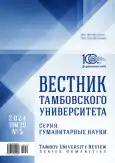An experiment on the differentiated teaching of English grammar to students at a technical university through educational interaction with a chatbot based on generative AI
- Authors: Cherkasova E.A.1
-
Affiliations:
- National Research Nuclear University MEPhI (Moscow Engineering Physics Institute)
- Issue: Vol 29, No 5 (2024)
- Pages: 1239-1247
- Section: THEORY AND METHODS OF FOREIGN LANGUAGE TEACHING
- URL: https://journal-vniispk.ru/1810-0201/article/view/297660
- DOI: https://doi.org/10.20310/1810-0201-2024-29-5-1239-1247
- ID: 297660
Cite item
Full Text
Abstract
Importance. Traditional methods and approaches in learning English language are substituted by digitalization of the educational process. The research aimed at developing and testing the methodology of teaching a foreign language to students of a technical university through educational interaction with a chatbot with generative AI, the purpose of which is to identify the effectiveness of the use of digital tools in pedagogical practice is determined as relevant and demanded.Research Methods. The research material was theoretical, empirical and analytical methods. First-year students of National Research Nuclear University “MEPhI” participated in the experiment on differentiated teaching of English grammar to students of technical universities by means of educational interaction with an AI chatbot.Result and Discussion. The experiment consisted of three stages: ascertaining, formative and control. At the first stage, an entrance grammar test was conducted to determine the initial level of grammatical skills of students in the control and experimental groups. At the second stage, the experimental group was taught English grammar using the proposed methodology, while the students of the control group were taught in the traditional way. At the last stage, the students of the two groups underwent final grammar testing, which allowed us to compare the results and conduct statistical analysis of the data.Conclusion. The statistical data confirm the validity of the author's methodology for differentiated teaching of English grammar to students of technical university through educational interaction with a chatbot.
About the authors
E. A. Cherkasova
National Research Nuclear University MEPhI (Moscow Engineering Physics Institute)
Author for correspondence.
Email: tomchuk.bel@yandex.ru
ORCID iD: 0009-0001-3517-8074
Lecturer at Foreign Languages Department
31 Kashirskoe Rte., Moscow, 115409, Russian FederationReferences
- Khutorskoi A.V. (2003). Key competencies as an integral part of a personality-centered educational approach. Narodnoe obrazovanie = Public Education, no. 2, pp. 58-64. (In Russ.) https://elibrary.ru/sguktl
- Canale M., Swain M. (1980). Theoretical bases of communicative approaches to second language teaching and testing. Applied Linguistics, vol. 1, no. 1, pp. 1-48. https://elibrary.ru/ilaqrh
- Ek van J.A. (1986). Objectives for Foreign Language Learning. Strasbourg, Council of Europe, 97 p.
- Safonova V.V. (2004). Communicative Competence: Modern Approaches to Multilevel Description for Metho-dological Purposes. Moscow, Evroshkola Publ., 233 p. (In Russ.) https://elibrary.ru/qwlvcr
- Sysoyev P.V. (2023). Artificial intelligence in education: awareness, readiness and practice of using artificial intelligence technologies in professional activities by university faculty. Vysshee obrazovanie v Rossii = Higher Education in Russia, vol. 32, no. 10, pp. 9-33. (In Russ.) https://doi.org/10.31992/0869-3617-2023-32-10-9-33, https://elibrary.ru/tzytkm
- Sysoyev P.V. (2023). Artificial intelligence technologies in teaching a foreign language. Inostrannye yazyki v shkole = Foreign Languages at School, no. 3, pp. 6-16. (In Russ.) https://elibrary.ru/qfmzhw
- Sysoyev P.V., Filatov E.M. (2023). ChatGPT in students’ research: to forbid or to teach? Vestnik Tambovskogo universiteta. Seriya: Gumanitarnye nauki = Tambov University Review: Series Humanities, vol. 28, no. 2, pp. 276-301. (In Russ.) https://doi.org/10.20310/1810-0201-2023-28-2-276-301, https://elibrary.ru/sphxkz
- Sysoyev P.V., Filatov E.M. (2024). Method of teaching students’ foreign language creative writing based on evaluative feedback from artificial intelligence. Perspektivy nauki i obrazovaniya = Perspectives of Science and Education, no. 1 (67), pp. 115-135. (In Russ.) https://doi.org/10.32744/pse.2024.1.6, https://elibrary.ru/tmstly
- Sysoyev P.V., Filatov E.M., Sorokin D.O. (2024). Feedback in foreign language teaching: from information technologies to artificial intelligence. Yazyk i kul’tura = Language and Culture, no. 65, pp. 242-261. (In Russ.) https://doi.org/10.17223/19996195/65/11, https://elibrary.ru/plzyov
- Titova S.V. (2023). Teaching foreign language writing skills in the digital environment of the university. Vestnik Tambovskogo universiteta. Seriya: Gumanitarnye nauki = Tambov University Review: Series Humanities, vol. 28, no. 2, pp. 302-317. (In Russ.) https://doi.org/10.20310/1810-0201-2023-28-2-302-316, https://elibrary.ru/vizjkh
- Yarotskaya L.V., Aleinikova D.V. (2023). Reviewing learning and teaching content in the scope of artificial intelligence: for humanities and social sciences majors. Vestnik Rossiiskogo universiteta druzhby narodov. Se-riya: Psikhologiya i pedagogika = RUDN Journal of Psychology and Pedagogics, vol. 20, no. 1, pp. 145-162. (In Russ.) https://doi.org/10.22363/2313-1683-2023-20-1-145-162, https://elibrary.ru/endlny
- Aleinikova D.V., Yarotskaya L.V. (2024). AI implications for vocational foreign language teaching and learn-ing: new meaning. Vestnik Tambovskogo universiteta. Seriya: Gumanitarnye nauki = Tambov University Re-view: Series Humanities, vol. 29, no. 1, pp. 46-56. (In Russ.) https://doi.org/10.20310/1810-0201-2024-29-1-46-56, https://elibrary.ru/qjcwkc
- Daggehn S. (2020). AI in Education: Change at the Speed of Learning. Moscow, UNESKO Institute for Infor-mation Technologies in Education Publ., 44 p.
- Cherkasova E.A. (2023). Didactic and methodical functions of chatbots in teaching foreign language grammar to non-linguistic students. Vestnik Tambovskogo universiteta. Seriya: Gumanitarnye nauki = Tambov University Review: Series Humanities, vol. 28, no. 6, pp. 1443-1451. (In Russ.) https://doi.org/10.20310/1810-0201-2023-28-6-1443-1451, https://elibrary.ru/cvexfj
- Sorokin D.O. (2023). Attitude of school and university students’ towards the use of artificial intelligence chat-bots in education. Derzhavinskii forum = Derzhavin Forum, vol. 7, no. 1 (25), pp. 21-30. (In Russ.) https://elibrary.ru/revite
Supplementary files








